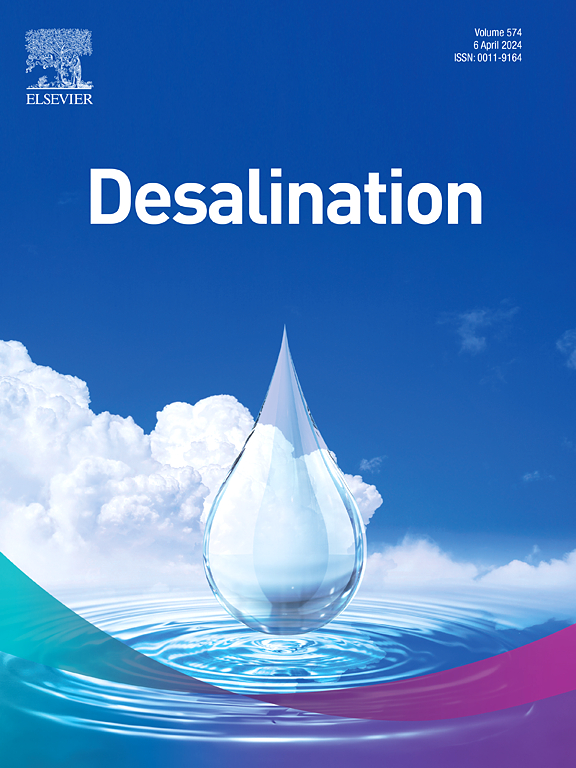Experimental performance and cost assessment of an energy-efficient zero liquid discharge treatment technology for high-salinity wastewater in arid regions
IF 8.3
1区 工程技术
Q1 ENGINEERING, CHEMICAL
引用次数: 0
Abstract
Energy-efficient and low-cost treatment technologies are essential for high-salinity wastewater. In this paper, a zero liquid discharge (ZLD) treatment technology is proposed. A test system was established in northwestern China. Experiments were conducted under different operating conditions of the simplified solar chimney-photothermal interfacial evaporation (SSC-PIE) system and the solar enhanced cooling tower evaporation (SECTE) system, and the optimal operating conditions were determined for each. As a result, the average evaporation rate of the SSC-PIE system reached a maximum of 0.606 kg/(m2∙h), and the SECTE system reached 13.336 kg/h. The performance coefficient (COP) of the SECTE system ranged from 26.33 to 37.09, outperforming mechanical vapor recompression (MVR) systems of ZLD process. Additionally, the SECTE system is suitable for promotion in areas with low land cost. Cost assessment indicates that, at the evaporation rate of 0.52 m3/day, the water production cost is 6.76 $/m3. Compared to MVR system, the treatment process proposed in this study highlights its cost competitiveness in arid regions.
干旱区高矿化度废水零排放节能处理技术试验性能及成本评估
对于高含盐废水而言,高能效、低成本的处理技术至关重要。本文提出了一种零液体排放(ZLD)处理技术。在中国西北部建立了一个试验系统。在简化太阳能烟囱-光热界面蒸发(SSC-PIE)系统和太阳能增强冷却塔蒸发(SECTE)系统的不同运行条件下进行了实验,并确定了各自的最佳运行条件。结果,SSC-PIE 系统的平均蒸发率达到了 0.606 kg/(m2∙h)的最大值,而 SECTE 系统则达到了 13.336 kg/h。SECTE 系统的性能系数(COP)在 26.33 至 37.09 之间,优于 ZLD 工艺的机械蒸汽再压缩(MVR)系统。此外,SECTE 系统适合在土地成本较低的地区推广。成本评估表明,蒸发率为 0.52 立方米/天时,制水成本为 6.76 美元/立方米。与 MVR 系统相比,本研究提出的处理工艺在干旱地区更具有成本竞争力。
本文章由计算机程序翻译,如有差异,请以英文原文为准。
求助全文
约1分钟内获得全文
求助全文
来源期刊

Desalination
工程技术-工程:化工
CiteScore
14.60
自引率
20.20%
发文量
619
审稿时长
41 days
期刊介绍:
Desalination is a scholarly journal that focuses on the field of desalination materials, processes, and associated technologies. It encompasses a wide range of disciplines and aims to publish exceptional papers in this area.
The journal invites submissions that explicitly revolve around water desalting and its applications to various sources such as seawater, groundwater, and wastewater. It particularly encourages research on diverse desalination methods including thermal, membrane, sorption, and hybrid processes.
By providing a platform for innovative studies, Desalination aims to advance the understanding and development of desalination technologies, promoting sustainable solutions for water scarcity challenges.
 求助内容:
求助内容: 应助结果提醒方式:
应助结果提醒方式:


